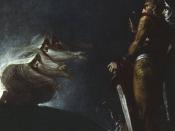supernatural forces in Macbeth
In the play 'Macbeth,' there were many interesting sections which
could be concentrated on due to the suspense and the involvement of the
supernatural. The use of the supernatural in the witches, the visions, the
ghost, and the apparitions is a key element in making the concept of the
play work and in making the play interesting. Looking through each Act and
Scene of the play, it is noticed that the supernatural is definitely a
major factor on the play's style.
The use of the supernatural occurs at the beginning of the play, with
three witches predicting the fate of Macbeth. This gives the audience a
clue to what the future holds for Macbeth. 'When the battles lost and won'
(Act I, Scene I, l.4) was said by the second witch. It says that every
battle is lost by one side and won by another.
Macbeth's fate is that he
will win the battle, but will lose his time of victory for the battle of
his soul.
After the prophecies of the witches' revealed the fate of Macbeth, the
plan in which to gain power of the throne is brought up. The only way to
gain power of the throne was for Macbeth to work his way to the throne, or
to murder King Duncan. Murdering the king was an easier plan since the
motivation in his dreams urged him on. Lady Macbeth also relied on the
supernatural by her soliloquy of calling upon the evil spirits to give her
the power to plot the murder of Duncan without any remorse or conscience
(Act I, Scene V, ll.42-57). The three sisters are capable of leading
people into danger resulting in death, such as the sailor who never slept
(Act I, Scene III, ll.1-37).
Lady Macbeth has convinced her husband Macbeth to murder King Duncan.
On the night they planned to kill Duncan, Macbeth is waiting for Lady
Macbeth to ring the signal bell to go up the stairs to Duncan's chamber. He
sees the vision of the floating dagger. The interest of the dagger is that
it leads Macbeth towards the chamber by the presence of evil of the dagger
being covered with blood. Then the bell rings and Macbeth stealthily
proceeds up the staircase to Duncan's chamber.
Once the murder has been committed, eventually Banquo has his
suspicions about Macbeth killing Duncan to have power of the throne. There
is constantly more guilt and fear inside Macbeth and his wife that they
decide to have Banquo killed. Macbeth and his wife attend a banquet in
which a ghost appears. Once the murderer notified Macbeth that the deed
was done, he observed the ghost of Banquo sitting in his regular seat.
This caused Macbeth to act in a wild manner, making people suspicious of
his actions. (Act III, Scene VI, ll.31-120).
The use of the supernatural has increased the suspense now that
Macbeth is constantly relying on the prophecies of the three witches.
Hecate, the Queen of witches is angry with the three sisters for not
involving her in their encounters with Macbeth. The witches plan to lead
Macbeth to his downfall by making him feel over-confident. (Act III, Scene
V, ll.1-35).
Further on in the play, Macbeth finds his way to the witches' cave and
demands to know what lies ahead for him. The three witches predict what he
is going to ask and produce the first apparition which is an armed head.
'Macbeth!, Macbeth!, Macbeth!, beware of Macduff; beware thane of Fife.
Dismiss me: enough.' (Act VI, Scene I, ll.77-78). The first apparition
tells Macbeth to beware of Macduff. Then the second apparition appears (a
bloody child), and says: 'Be bloody, bold, and resolute; laugh to scorn the
power of man, for none of woman born shall harm Macbeth.' (Act IV, Scene I,
ll.85-87). This apparition informs Macbeth that no man born from a woman
can harm him. Finally, the last apparition appears and is a child crowned,
with a tree in his hand. The apparition is saying that he will never be
defeated until Great Birnam wood shall come against him to High Dunsinane
Hill. 'Be lion melted, proud, and take no care who chafes, who frets, or
where conspirers are: Macbeth shall never vanquish'd be until Great Birnam
wood to High Dunsinane Hill shall come against him.' (Act VI, Scene I,
ll.98-102). These apparitions convinced Macbeth that this was his fate and
became over confident, and lead him to his death.
The use of the supernatural in Macbeth results quite well with the
respect of the unknown. Without the witches, the ghost, the visions, and
the apparitions, 'Macbeth' would have been a dull and tiresome play. Even
today's readers need motivation to read, and this ancient superstition of
spirits enhanced the play dramatically.


